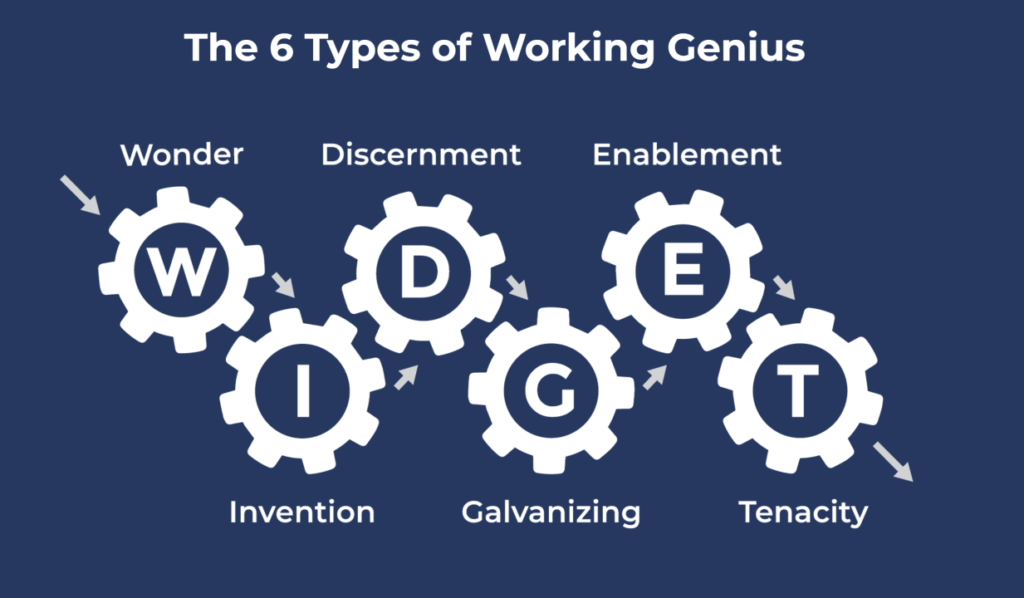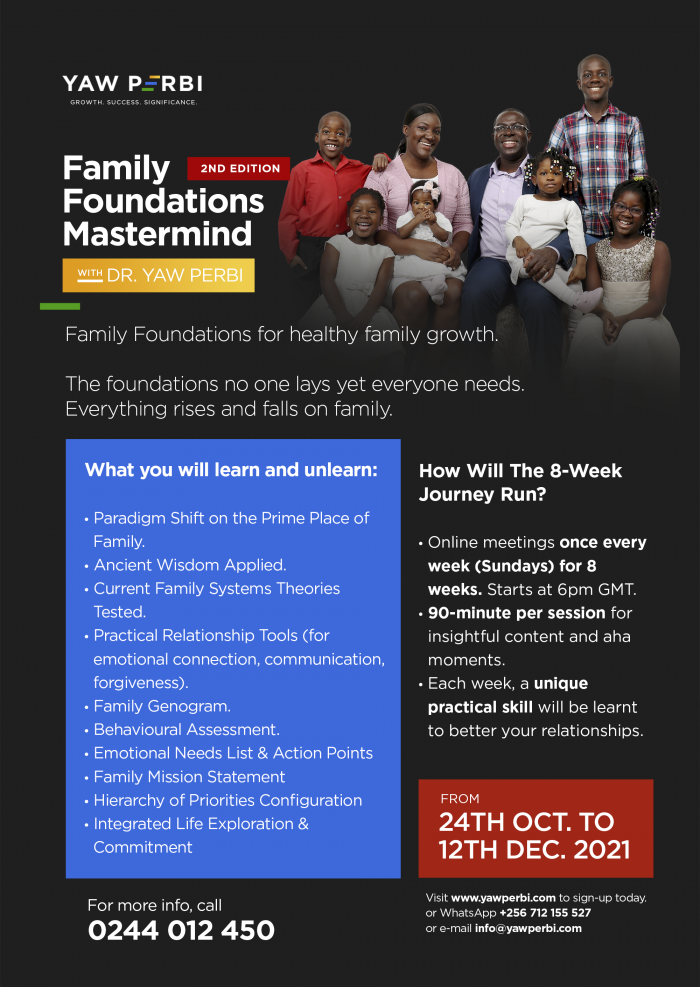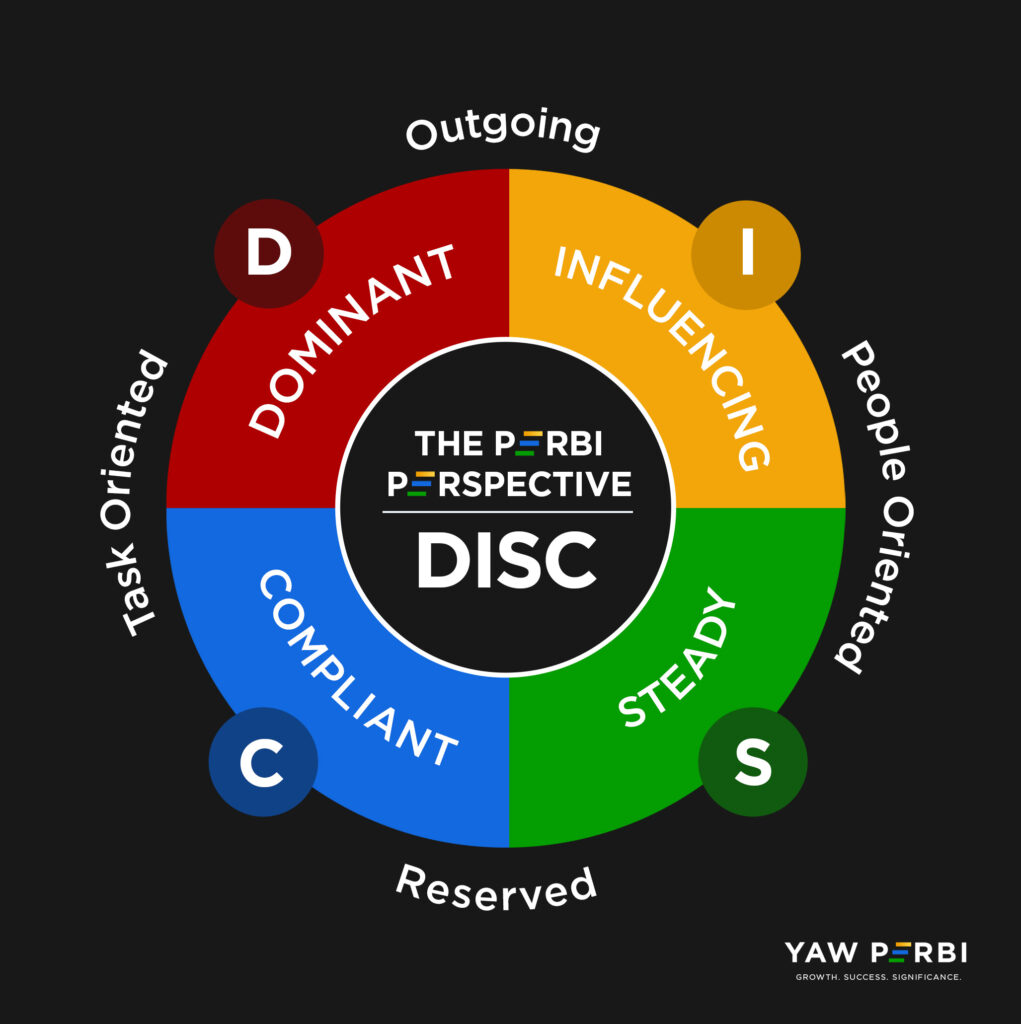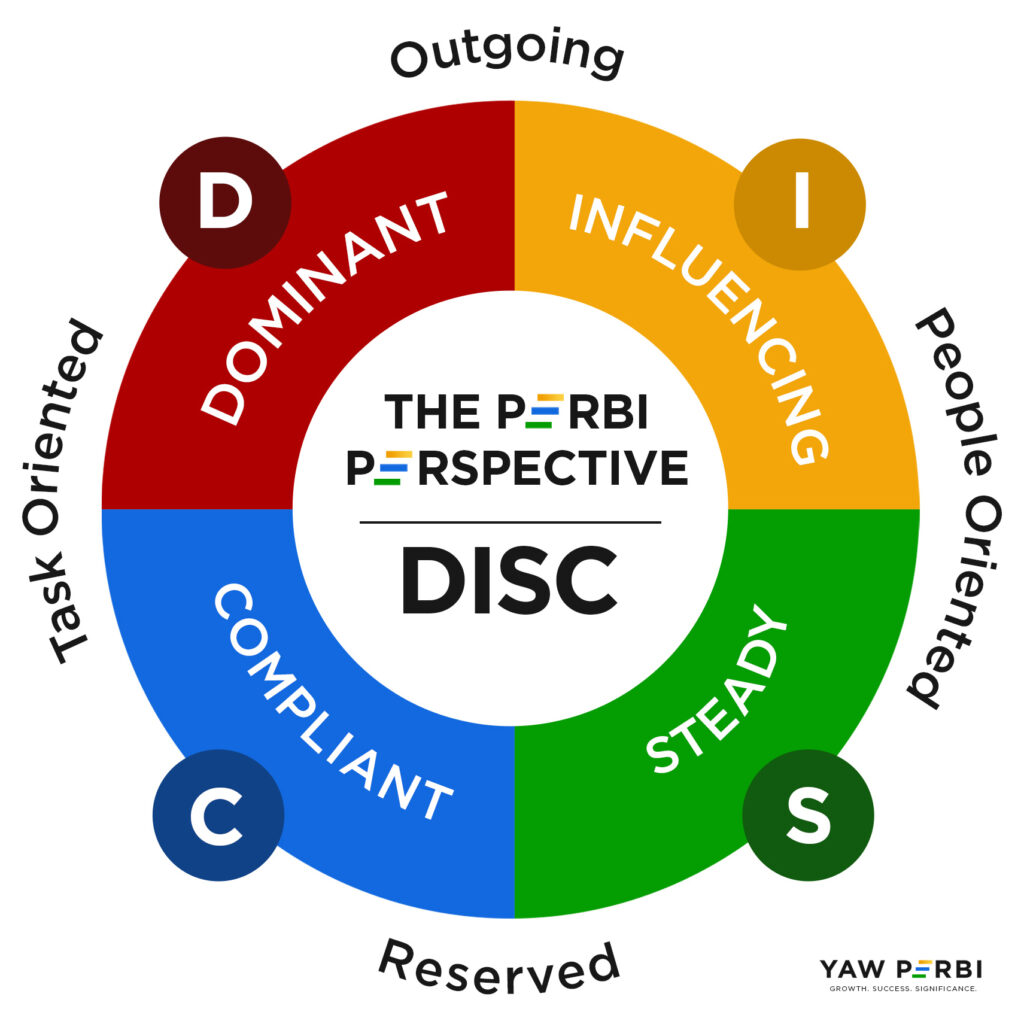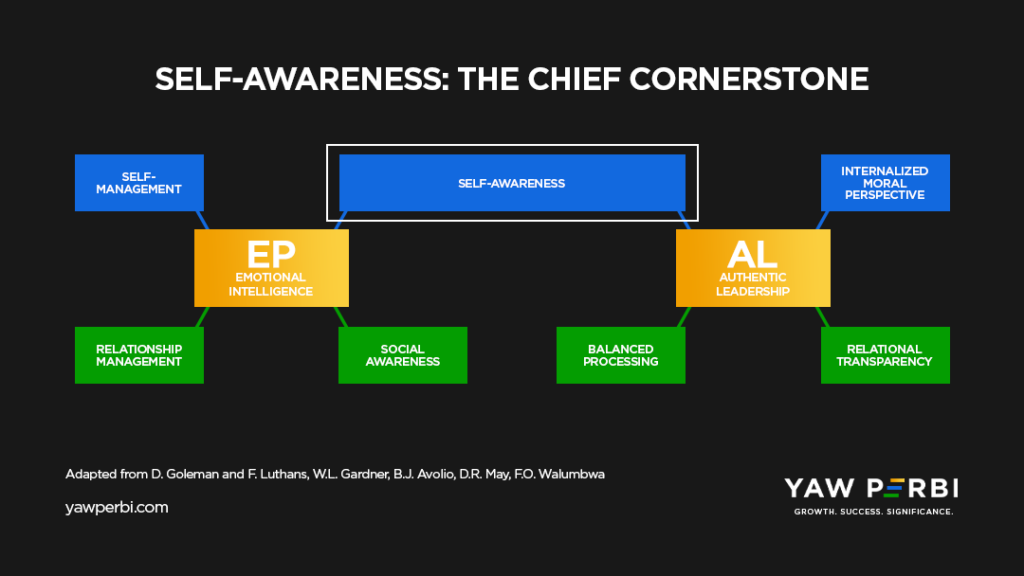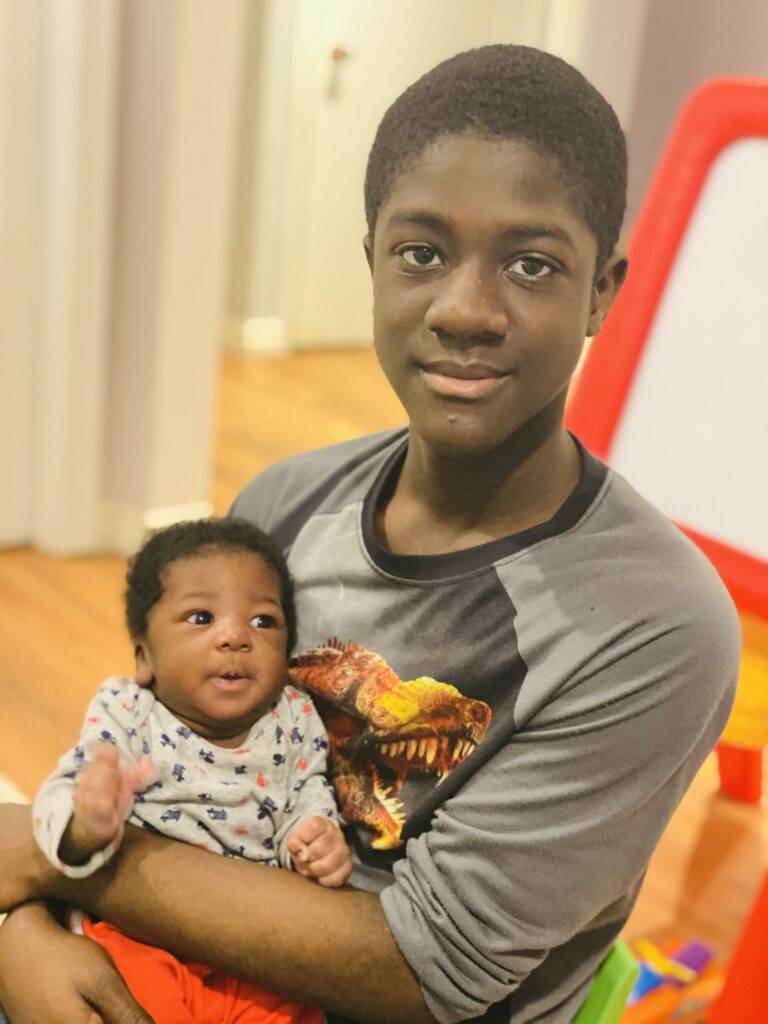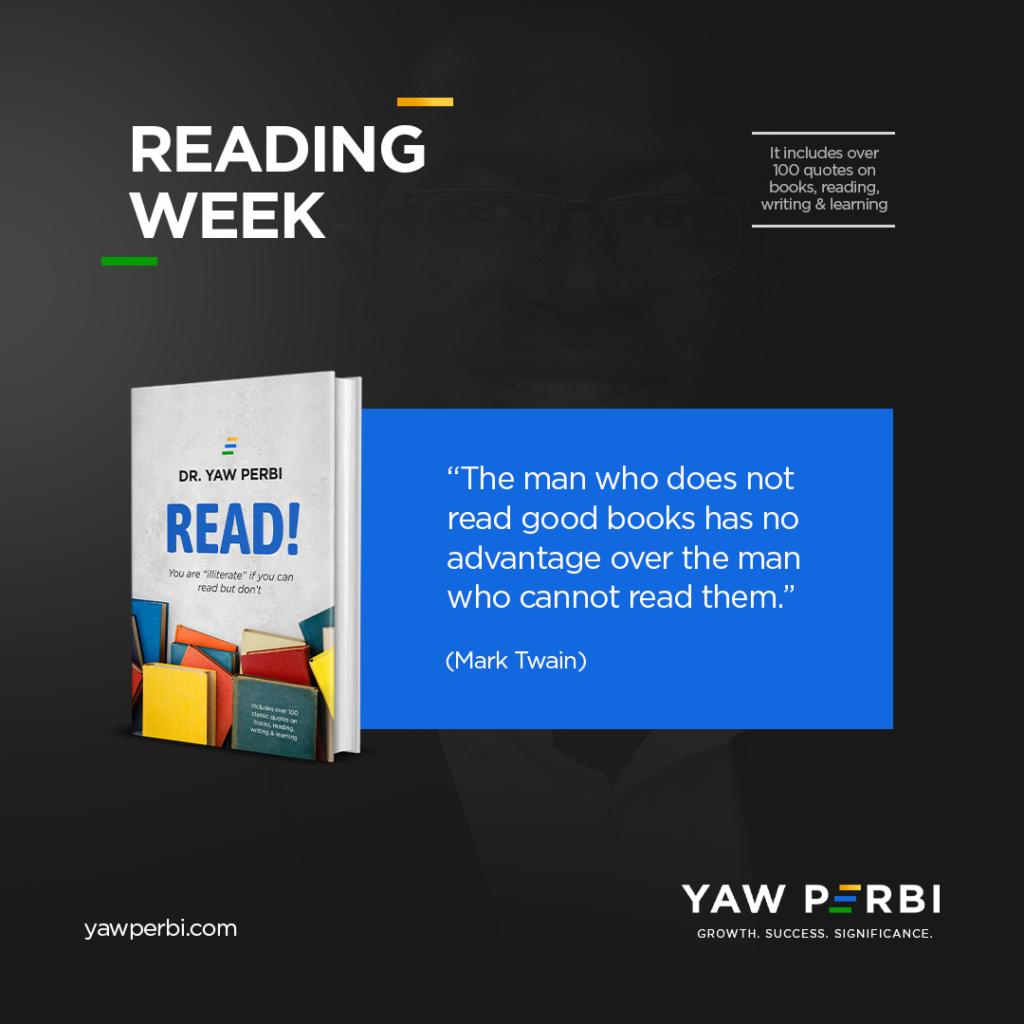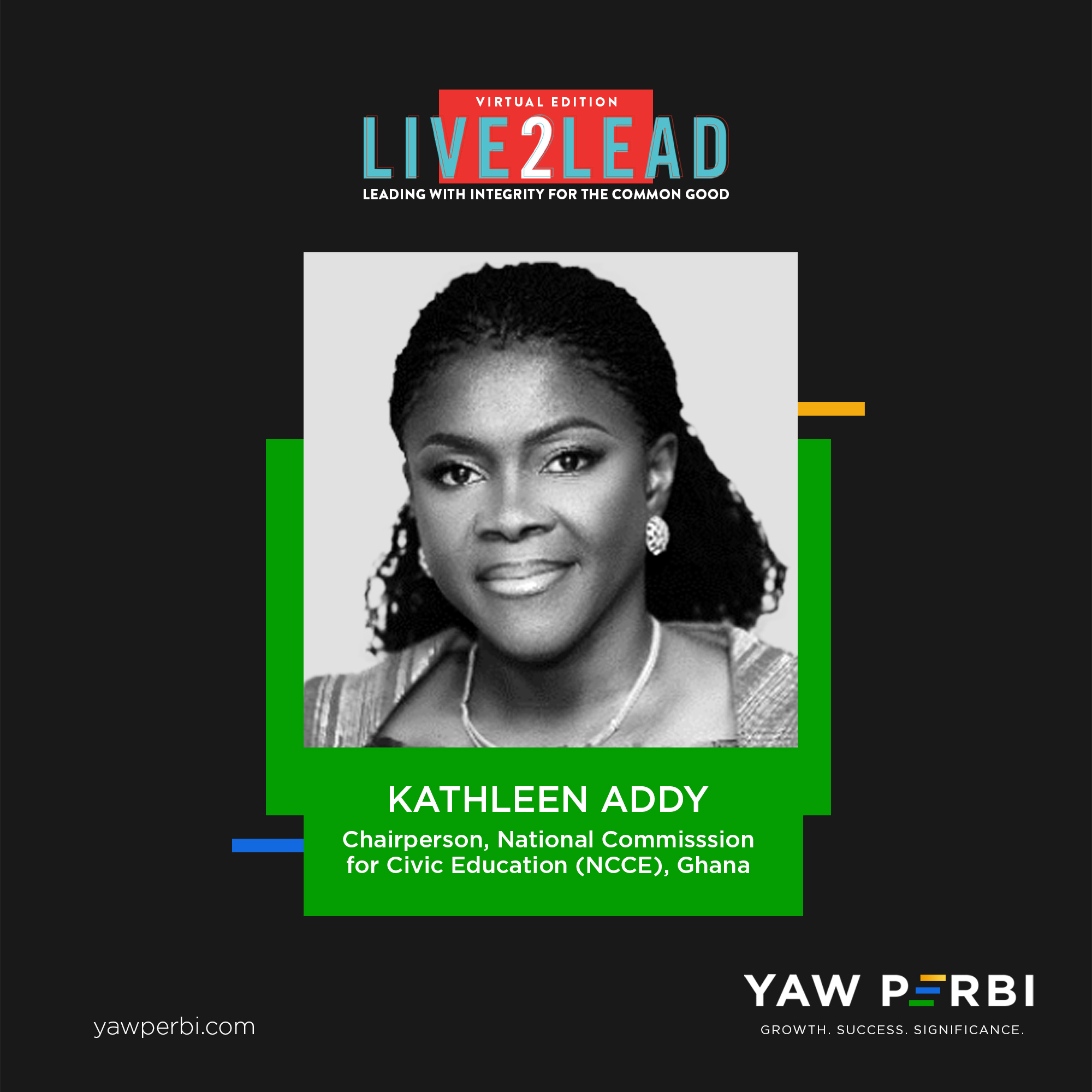
Meet Kathleen Addy, the Lady with Gravitas for Civilitas
Kathleen Addy is the Republic of Ghana’s National Commission for Civic Education (NCCE) chairperson, appointed in 2022 by the president of the Republic from her Deputy Chair of the Commission role. Ms. Addy had been in charge of Finance and Administration since 2017. Kathleen is highly regarded as a civic activist with particular interest in women’s empowerment as well as accountable and responsive governance, and has supported different civil society groups fighting for good governance and women’s rights in Ghana.
She was once upon a time a Research and Communications Officer at the Center for Policy Analysis focusing on Women’s Economic Empowerment and was the Afrobarometer Communications Manager at the Center for Democratic Development. Kathleen holds a first degree in Psychology and a Master’s in Communications from the University of Ghana, Legon. She is also an alumna of Achimota School and Holy Child School. In her role as a Chairperson of the NCCE, Ms. Addy brings her expertise and vast experience in the development sector, as well as her passion and drive to bear on the work of the commission.
Gravitas was one of the ancient Roman virtues that denoted “seriousness.” It is also translated variously as weight, dignity, and importance and connotes restraint and moral rigour. It also conveys a sense of responsibility and commitment to the task. Kathleen’s got gravitas. Meanwhile cīvīlitās, the feminine Latin word that speaks to politics and the art/practice of government, also connotes courteousness, politeness, dignity, civility, moderation, and restraint. Not only has Lady Kathy got all these, she has a passion to see every Ghanaian born of a woman possess these, and in abundance too, hence her passion for civic education.
INTEGRITY AND A NEW GHANA
At the just-held Live2Lead conference, the First Lady of Civilitas began her submissions with a chuckle, as she noted with candour how the public sector from which she hails has become the poster child for lack of integrity. She herself shared how coming from think tanks and CSOs, she got a culture shock when she first landed in the public service in 2017. “A lot of people don’t even know what the wrong thing is because wrong has been normalized,” she asserted.
But she ended with a ROAR. By the time she had shared how ‘friends and family’ who expected favours like getting an upper hand in the commission’s hiring had had a rude shock that she only gave them enough support to follow due process, the audience would doff their hats for such a principled public sector leader. We trust that the many public sector folks sponsored to attend were inspired to also lead with integrity, right in the corner where they are.
CONCLUSION
Live2Lead Ghana was wildly successful. We give glory to God. The plan to strategically rope in the public sector was a good idea and well-executed. We are grateful to all our corporate partners whose generous sponsorship made this possible, and the participation of several emerging leaders from our schools and universities. The dozen or so organizations and companies who ensured 10 or more of their leaders were present are true patrons of a Ghana that can be lead in integrity for the common good. One bank sponsored nearly 60 of their leaders, while another invested in 40 of theirs. Poco a poco, intentionality about leadership development will become a culture that rewires our nation for growth, success and significance.
God bless our homeland Ghana with gravitas for civilitas, and make our nation great and strong.
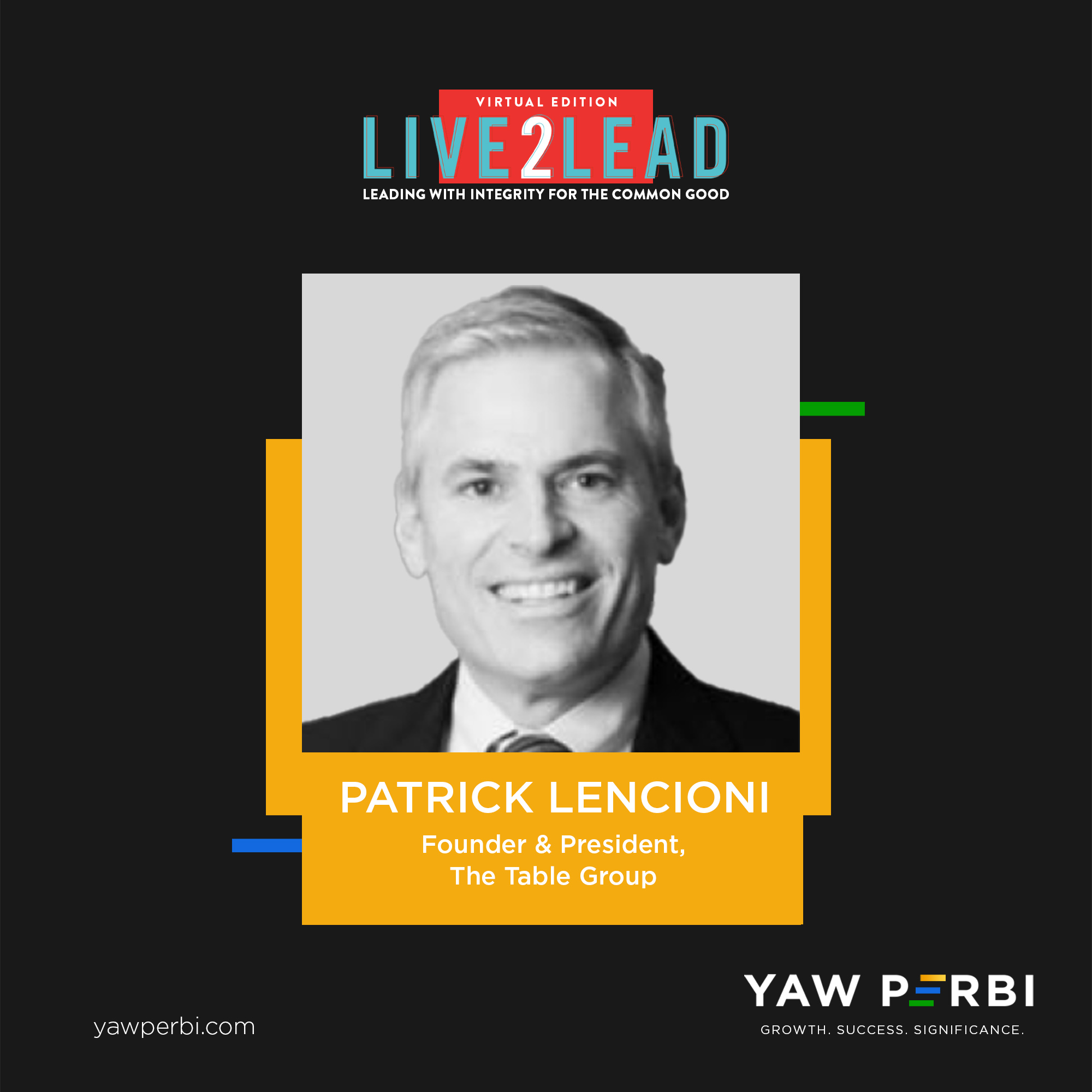
Meet Patrick Lencioni, the Workplace Guru.
There’s no one I enjoy hearing about teams, meetings and workplace dynamics like Patrick Lencioni. Patrick is an American author of books on business management, particularly in relation to team management. He is best known as the author of The Five Dysfunctions of a Team, a popular business fable that explores work team dynamics and offers solutions to help teams perform better. On a recent trip to southern and eastern Africa, his cautionary tale to CEOs published in a book by the title The Motive, was my jolting companion. It brought me back to my senses as CEO of a few enterprises.
Lencioni is Founder and President of The Table Group, a management consulting firm specializing in executive team development and organizational health. As a consultant and keynote speaker, he has worked with senior executives and executive teams in organizations ranging from Fortune 500s and high tech start-ups to universities and non-profits. He also gives talks on leadership, organizational change, teamwork and corporate culture. He is frequently interviewed for national media including features in the Wall Street Journal and USA Today.
SIX TYPES OF WORKING GENIUS
At the annual John Maxwell Live2Lead conference last week–the Ghana site hosted nearly 600 leaders LIVE! with thousands more to benefit through rebroadcasts–we heard from Patrick Lencioni about his groundbreaking new model that provides a deeper understanding into our workplace and team dynamics.
The six types of working geniuses together form the word WIDGET, symbolized by six gears working perfectly synergistically well together. W is the genius of Wonder, I the genius of Invention, D the genius of Discernment, G the genius of Galvanizing, E the genius of Enablement and T the genius of Tenacity. In the near future we shall provide a fuller blog delving into further details about these six geniuses. In the mean time hear Pat the sage, “If you want to be successful and fulfilled in your work, you must tap into your gifts. That can’t happen if you don’t know what those gifts are.”
THINGS DON’T HAVE TO BE THIS WAY
Pat explained how people don’t understand their personal areas of working genius, which impacts their ability to identify work opportunities that would be most meaningful to them, as well as disallowing organizations, teams, and families to help individuals tap into their true working genius, resulting in a failure to reach one’s true potential. But things don’t have to be this way. This tragedy is avoidable, as Pat shared how you can identify your working genius and understanding which one of the six geniuses both you and your teammates are. Contact us, the Live2Lead team, if you and your team would want to test your genius to become all you really could be. There are no dumb or lazy people on the planet or on your team; only geniuses who are yet to find and fire up what makes them tick!
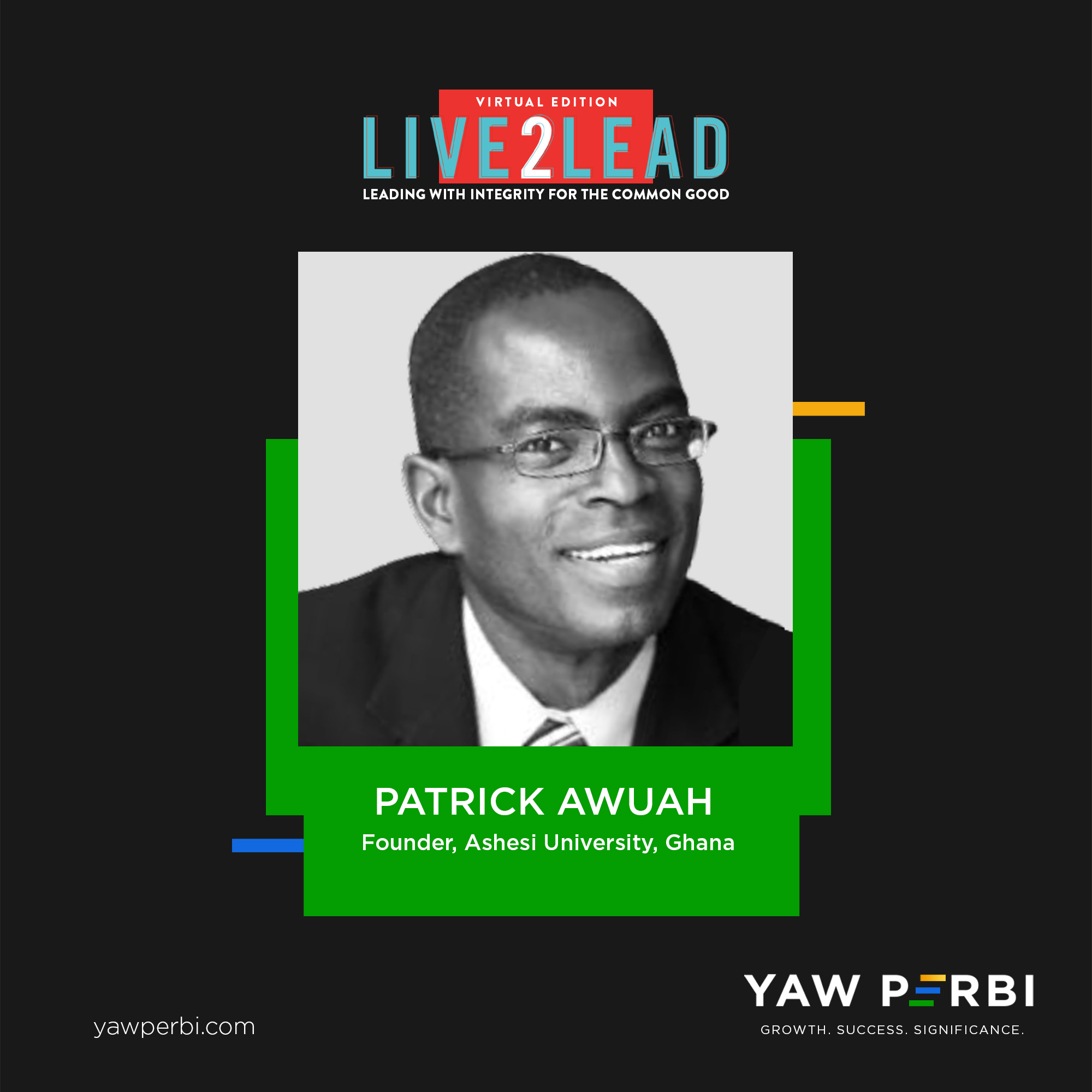
Meet Patrick Awuah, Trailblazer in International Education Brewed in an African Pot
Last Friday, I spent some time with friend, mentor and fellow African Leadership Initiative/Aspen Global Leadership Network Fellow, Patrick Awuah Jr. It was a joy to see and hear afresh his commitment to the cause of leadership development on the continent of Africa. And this personal pledge is to the extent that he will be excusing himself from a crucial Ashesi University board meeting to address the leaders virtually gathered at Live2Lead and then dive right back into the governance matters of this leading African establishment.
Patrick Awuah is a Ghanaian engineer, educator, and entrepreneur. Patrick founded Ashesi University in 2002. Dr. Awuah, with three honorary doctorates (Swarthmore College 2004, Babson College 2013, University of Waterloo 2018) to his name, has won numerous other awards as an individual and as the founder of Ashesi University. He was presented with the Order of the Volta Award to recognize his contribution to tertiary education in Ghana in 2007. In 2009, Awuah won the John P. McNulty Prize. In 2010, Awuah was awarded 87th most creative businessperson by Fast Company. In 2014, he received The Elise and Walter A. Haas International Award, which honours UC Berkeley alumni with distinguished records of service to their native country. In the same year, he was named best social entrepreneur by the Schwab Foundation for Social Entrepreneurship. In 2015, Awuah was listed by Fortune as number 40 in world’s 50 greatest leaders and was awarded a MacArthur Fellowship. In 2017, Awuah was awarded the World Innovation Summit for Education (WISE) prize, a major global education award.
INTEGRITY IN LEADERSHIP FOR THE COMMON GOOD
”INTEGRITY” is an often-used but little understood (and even less practiced) word in Ghana today. Patrick will be the keynote speaker on the theme for this year’s Live2Lead, “Leading with Integrity for the Common Good.” Ashesi has a fascinating story about an honour code and how its implementation nearly jeopardized Ashesi’s accreditation process. This tale has everything to do with instilling integrity, and for those of you who are not privy to the terrific tale, we shall be impressing upon Patrick to share “from the horse’s own mouth.”
Patrick will address what integrity actually means and share practical examples where he’s led with integrity and times his integrity has been challenged. Dr. Awuah will practically tip all and sundry on how integrity is taken off the wall and printed in hearts and minds on four levels: (1) personally (2) as teams (3) organisation-wide and (4) nationally.
You don’t want to miss Patrick Awuah’s fireside chat session at Live2Lead Ghana 2022. Grab your seat right here right now.

Raise the Roof, Lift your Lid!
I just arrived at my room in Cape Town after three flights from Accra to Nairobi, Nairobi to Johannesburg and Jo’burg to Cape Town. A question on my mind as l flew here far above sea level, sometimes as high as 38,000 feet, has been, “How high is your leadership lid?”
THE FIRST OF THE IRREFUTABLE LAWS OF LEADERSHIP
Of course you know what a lid is, the cover of a container. How high your lid is determines the quality of the leadership that you provide for those you lead. I learnt this a long time ago, some 20-25 years ago from John Maxwell’s 21 Irrefutable Laws of Leadership. It was the very first of the principles of leadership he espoused in that bestseller and my life has never been the same since.
As John challenged me then from the written word—and many years later in-person—I must always endeavour to lift my leadership lid because no family, organization, church, community or country would ever grow past their leader. The leader is the lid over those (s)he leads. Sometimes when training leaders I ask, “are you a leader or ‘lidder’? because a leader is literally the lid on the progress and prosperity of their constituency. In a sense, every leader is a lidder; the question is “how high?”
IMAGINE THIS PRESIDENTIAL LID
You probably have heard me tell the story of a certain African president that a group of us, Maxwell certified leaders, were trying to connect in-person to John C. Maxwell for a national transformation process and programme. This president had never heard of John. In all probability, he hadn’t read any other contemporary leadership experts but hopefully he has digested at the very minimum some of the leadership classics like Plato’s, ‘The Republic’. It is a scary thought that this African nation—and by extension every family, organization, corporation, community, church etc. within her—would be constrained by the tightness of this head of state’s lid. I almost added, “through no fault of theirs,” but I guess they voted him into power.
HOW TO LIFT YOURS
While we educate a new generation that should be too enlightened to allow such tight lidders to lead African nations in the next decade, let me ask you, let’s get personal: how high is your lid? We forget, many of us (or we might even not know), that leadership is not just caught, it must be taught. And that’s why I love the opportunity, come October 07, for us all to be part of a life-altering, lid-lifting Live2Lead virtual experience with local faculty and global ones beaming all the way from Atlanta, Georgia.
We are gunning for 2,000 leaders—from emerging (youth) leaders, through leaders in the establishment (i.e. government/public sector leaders) to established leaders in the private sector, including executives from the corporate space. We will be taught in word and deed by powerful speakers and shakers like John C. Maxwell himself, two Patricks (Lencioni of the USA and Awuah of Ghana) and a Patricia (CEO of Vodafone, Ghana).
RAISE THE ROOF!
One of the most powerful discoveries in psychology over the last generation has been that people can learn and grow and change! So wherever your lid is today, if you learn to lead better you provide more room for those you lead. John will be the first to tell you that “your capacity determines your impact.”
Perhaps, some of the conflicts you are experiencing right now in your organization, church or wherever you lead is because your lid is too low and so people keep hitting it. And there is going to be continued tension and banging (conflict) till at some either you leave the stage or your people take their exit. As you have probably heard it said, people join organizations but they leave people (managers/leaders). It’s time to make room, lift your lid, raise the roof!
I have been part of things l left because the lid was too low. It just wasn’t life giving and l know people have also left my leadership when my lid was low because it was just too tight. Learn to lead. Each one of us can learn to lead better. Blow off the lid so that all of a sudden the people under your leadership feel this space and freedom because you lifted your lid and now they can breathe and create and innovate and… live again.
Join us at Live2Lead Ghana 2022, on October 7, and let’s all learn to lead better so that the people following our leadership can live better. If leading is your purpose on earth—that you live2lead—then you might as well as learn2lead, and do it well. As Donewell Insurance puts it, “If it must be done, it must be done well.” If we must lead, then we must lead well. Let’s blow off some lids and see our constituents blessed beyond measure, growing great and strong.
Right outside my hotel room window is the breathtaking view of the majestic, towering Table Mountain at 3,500 feet above sea level with no real ‘peak’ per se. No lid! So in the meantime, while you contemplate your lid, I will enjoy Cape Town on your behalf.
Post Script
Register and join LivetoLead here.
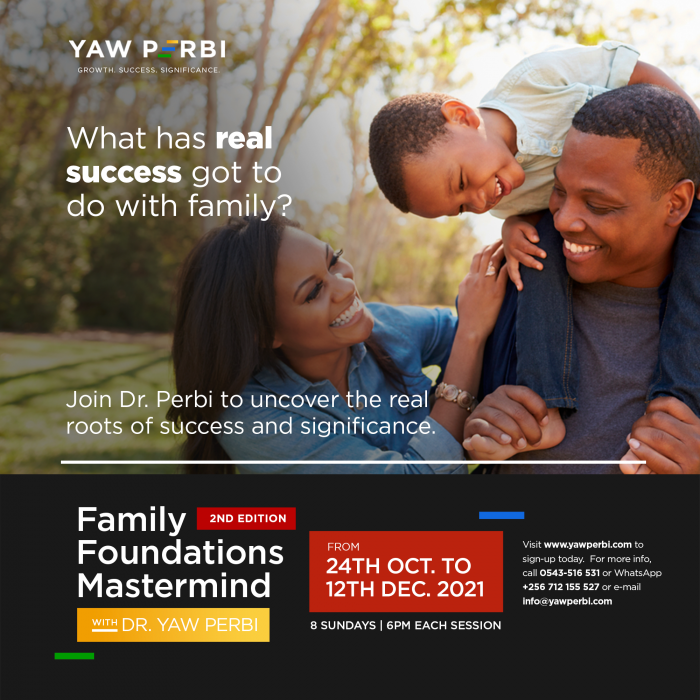
Family Foundations and Success: Will Your Anchor Hold?
We live in perilous times. Don’t you sometimes feel like the world is spinning out of control ? One of the most important things we must cherish and hold on to is family. Every single one of us has a family–no matter how (dys)functional and emotionally or geographically removed. The family is the fundamental unit of human existence. Nothing good happens on Earth if it is broken or destroyed. A society is only as good as the families that constitute it.
It is not only the concept of family that is important but also the actual living out of what family should be. Humans are described as social creatures. We make friends, live in communities, and connect with strangers based on common elements. Social media has recently emerged as a new way for people to connect with childhood peers, friends of friends, and even strangers. Nothing is more central to social life than the concept of family. Our families represent our earliest and, often, most enduring relationships.
Earlier this year, a Family Foundations Mastermind was held, with a sizeable number of couples (and some individuals) participating. All present could see that there are important things everyone should know, be, and do about the family yet no one had done! How can we expect family to be strong and stable if we ignore the fundamental roles of human existence? As a result, a popular request has been made for it to be repeated, even though we had planned this quarter to run a Financial Whizzdom Mastermind, which many were anticipating. We apologize for any inconvenience, but signing up for the upcoming Family Foundations Mastermind would never be a mistake.
With what is going on around us in this LGBTQI+ era, there is an urgent need to apply ancient wisdom and put current family systems theories to the test. The abiding questions in the 19th century hymn Priscilla Owens come to mind:
“Will your anchor hold in the storms of life, when the clouds unfold their wings of strife?When the strong tides lift, and the cables strain, will your anchor drift, or firm remain?”
We encourage everyone to participate in this mastermind as it will be both enjoyable and educational. We will explore:
Why a systematic study of family itself is important
The prime place of family (get ready for paradigm shifts!)
Ancient family wisdom (we’ll apply these)
Current family systems theories (we’ll test some)
Basic tools for emotional connection
Essential communication tools
The forgiveness exercise
Unique emotional needs and how to fulfill them
Mapping out your family genogram
Drawing up a family mission statement
Prioritization: Recognizing the place of work, family, friends, church/community, and other responsibilities that require your attention.
The idea of the integrated life over the notion of balance
And much more!
Note that this is not a masterclass but a mastermind. Inasmuch as there will be some core teaching, more central will be the concepts and tools that are put on the table for everyone to contribute their perspectives and experiences and practically learn together things together that no one could have taught us. Dr. Yaw Perbi is a guide by the side in masterminds rather than a sage on the stage, typical of a masterclass.
WHAT’S SUCCESS GOT TO DO WITH FAMILY?
Everything. As John C. Maxwell poignantly puts it, success is when the people who know you the best (family) love and respect you the most. Join this journey of growth to discover the real roots of success and significance. Family is essential. Whatever we see in society has a direct correlation with family. The family is the fundamental unit of society and humanity. We can discuss all seven sectors of life or spheres of influence, but only family actually produces human beings. Come learn how to be a better family member and how to be/do family better.
We are excited to have you. Register via this link as soon as possible. First come, first guaranteed.
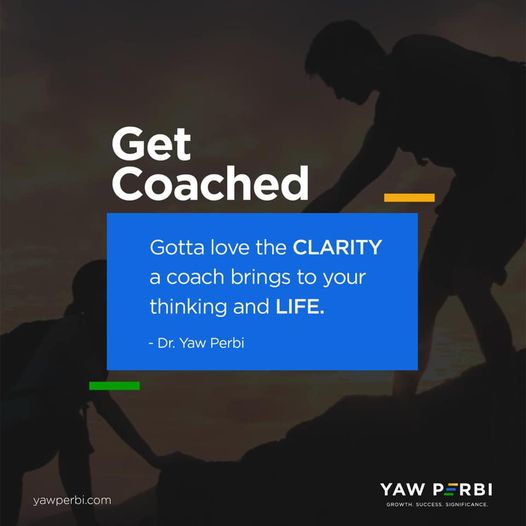
50 Shades of Coaching
Here is a list of about 50 kinds of coaching:
❖ Academic Coaching: Helping One Achieve Academic Excellence
❖ ADD/ADHD Coaching: To Understand the Most Common Learning Disorder – Attention Deficit Disorder / Attention Deficit Hyperactivity Disorder
❖ Alternative Lifestyle Coaching: To Get You Motivated, Strengthen Your Commitment and Re-align Your Goals
❖ Athlete Coaching: To Help Athletes Live a Balanced Life, Both Personally and Professionally
❖ Assessment Coaching: Walking Through Behavioral, Personality and Other Assessments Like the DISC
❖ Bereavement Coaching: Walking Through Painful Events with a Like Mind
❖ Business Coaching: Your Way to Business Success
❖ Career Coaching: Your Way to Fulfilling Your Financial Dreams
❖ Christian Life Coaching: Your Way to Emotional Maturity and Spiritual Fruitfulness
❖ College Entrance Coaching: Helping You Attend the School of your Dreams
❖ Communication Coaching: Opening Up the Link Between People
❖ Conflict Coaching: Working One on One to Achieve Balance
❖ Co-Parenting Coaching: Helping Divorced Parents Create a Positive, Workable Parenting Relationship
❖ Couples Coaching: Improving Communication Between Partners
❖ Creativity Coaching: Creative Struggle is Integral to the Life of the Artist
❖ Divine Purpose Coaching: To Re-Identify and Connect with One’s Centre
❖ Divorce Coaching: Helping People Transition to a New Life
❖ End of Life Coaching: Helping Those Left Behind
❖ Entrepreneur Coaching: For More Than Starting up a New Business
❖ Ethics Coaching: Living with Authenticity
❖ Executive Coaching: Moving the C-Suite On an Up to Take Your Team to the Next Level
❖ Family Coaching: Helping Families Work Through Difficult Issues
❖ Health and Wellness Coaching: Focusing on the Whole Being
❖ Holistic Health Coaching: Finding the Light at the End of the Tunnel and Balancing the Mind, Body and Spirit
❖ Laughter Coaching: To Bring More Lightness and Freedom
❖ Leadership Coaching: Putting You in the Right Direction to Chart the Course for Others
❖ Life Coaching: Your Way to Personal Success
❖ Men’s Empowerment Coaching: Helping Men Succeed with Excellence
❖ Military Transition Coaching: Helping You Adapt to Civilian Life
❖ Motivational Coaching: Helping One Achieve Personal Excellence
❖ Nature Coaching: Helping to Become One with Nature
❖ New Age Coaching: Self-help and New Thought Modalities
❖ Organizational Coaching: Clearing the Way to Clarity and Direction
❖ Parenting Coaching: Helping Parents Communicate and Understand their Children
❖ Pastoral Coaching: Coming Alongside Shepherds of God’s People
❖ Peer Coaching: Coaches Coaching Coaches
❖ Personal Development Coaching: Centers Around the Aspects of One’s Personal life
❖ Personal Finance Coaching: Your Way to Financial Freedom
❖ Physician Coaching: Helping Physicians Find a New Journey
❖ Recovery Coaching: Your Way to Recovering with Success
❖ Relationship Coaching: Building Personal and Professional Relationships
❖ Retirement Coaching: Transitioning to a New Life Stage
❖ Sales Coaching: Your Way to Increased Success and Profitability
❖ Self-Esteem Coaching: Helping People with Feelings of Value and Worth
❖ Singles Coaching: Helping Singles Find Healthy, Loving Relationships
❖ Special Needs Coaching: Helping Disabled Families and Individuals
❖ Spiritual Coaching: Helping People to Connect to the Divine
❖ Stress Management Coaching: Helping People Identify and Reduce Stress
❖ Success Coaching: Your Pathway to Personal and Professional Success
❖ Transitional Coaching: Helping People Through Big Life Changes
❖ Transpersonal Coaching: Finding Your Greatest Potential
❖ Weight Loss Coaching: Discovering New Healthy Lifestyles
❖ Women’s Empowerment Coaching: Encouraging Women to Embrace Their Talents
❖Youth Empowerment Coaching: Encouraging Young People to Discover and Fulfill Their Potential
This list is an adaptation of a list of 52 Life Coaching Niches Working Miracles Everyday by our coaching partner Barbara Wainright. You may go here to download a free copy of the book to discover which coaching niche is right for you!
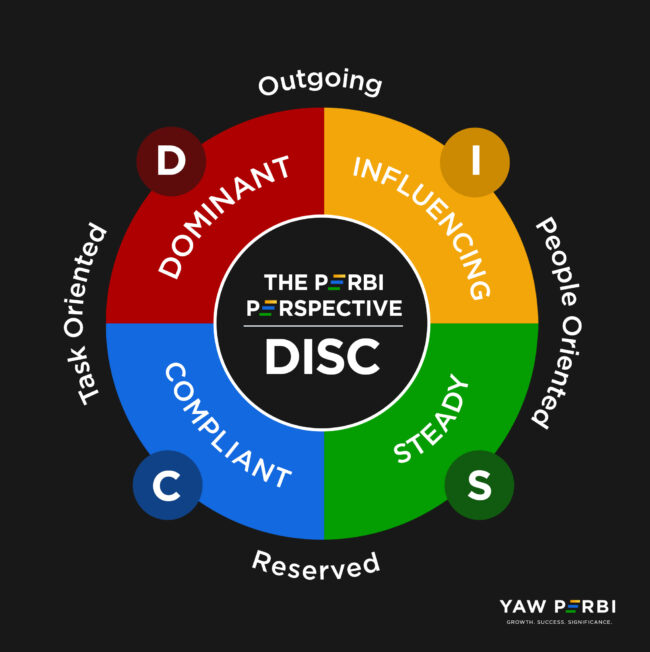
Getting DISCed is as Important as Getting Vaxxed!
It’s amazing how much most people know about subjects in our world, literally from Archaeology to Zoology, but very little or no ME-logy! In my book, Cutting a Straight Path: Leading with Self-Awareness, I ask these poignant questions:
- How can you live with yourself without knowing who you are?
- How can you be true to what you know little or nothing about: yourself?
- How can you succeed in life, self-actualize, without first becoming self-aware?
- How can you authentically lead others without first learning to know yourself?
- Have you ever felt frustrated why others are hesitant to follow your lead?
“Maybe it’s time to check yourself as a person and as a leader,” is my conclusion. Yes, it’s about time! Indeed, the Chinese have a powerful saying, “Before preparing to improve the world, first look around your own home three times.” Forget about authentic living, let alone authentic leadership, without self-awareness! So welcome to home base. Self-awareness is the starting place of all true and lasting success.
SELF-DISCOVERY THROUGH THE DISC
Self-awareness comes basically by introspection (by ourselves) and feedback (by others). Both however, are greatly enhanced by assessment tools, just like magnifying glasses help us see tiny objects and the binoculars enables us to view distant things closely and clearly. I have found the DISC as an amazing personal assessment tool that is incisive and powerful in the quest for self-awareness. Since 1972 it has been used by over 50 million people to increase self-awareness, stimulate and guide growth and thus increase chances at personal success. It is used to engender teamwork, communication and productivity in the workplace. The DISC has saved many a marriage, including mine!
DISC assessments are used in thousands of organizations around the world, from multilaterals and multinationals to government agencies and Fortune 500 companies, nonprofits and small businesses. Recently, we were privileged to serve the Centre for Disease Control Foundation in Atlanta, USA with nearly 150 of these assessments as they train medical leaders in about 30 nations of the world.
SO WHAT EXACTLY IS DISC?
DISC is an acronym that stands for the four main personality profiles described in the model: (D)ominant, (I)nfluencing, (S)teady and (C)ompliant.
People with D personalities tend to be confident and place an emphasis on accomplishing bottom-line results.
People with i personalities tend to be more open and place an emphasis on relationships and influencing or persuading others.
People with S personalities tend to be dependable and place the emphasis on cooperation and sincerity.
People with C personalities tend to place the emphasis on quality, accuracy, expertise, and competency.
The DISC system we use at YAW PERBI in partnership with People Keys generates 41 personality blends from these basic four, just like many colours of the world are generated through the three primary colours. There’s one I used to coach international students in Canada that was limited to 28 personality blends. What we use now is like the difference between a regular car and a four-wheel drive. As they like to say at People Keys, “people are different, true, but they are predictably different.”
CONVICTION, VISION & MISSION
Our conviction at YAW PERBI is that since every true and lasting success begins with self-awareness, then everyone must have easy and affordable access to self-DISCovery! ACCESS FOR SUCCESS, please! Everyone has a right to self-awareness. We need a DISC Revolution!
Our vision is to see a world of awareness through every individual’s self-DISCovery. We are on a mission to democratize the DISC personality/behavioral assessment until no one is left in the dark. We want to recalibrate all leadership development to begin with self-awareness at the core through the Perbi Perspective DISC is a great start.
CHIEF CORNERSTONE FOR THE CHIEF-LEVEL LEADER
When you read my article on how I build leaders differently now (compared to 10-15 years ago), you will understand my seriousness about this issue of recalibrating all leadership development to begin with self-awareness. People have big, fat leadership books and terabytes of leadership materials and yet have next to zero knowledge of themselves. What sense is there in that? I was telling a certain Christian leader the other day that he can forget the list of a dozen books people typically ask me to recommend for leadership training and development. The only two books his emerging leaders need to learn almost everything they need to know about leadership are a self-awareness printout of their DISC assessment and the Scriptures. Every other book is garnishing.
In all the major success paradigms, praxes and paths—from Emotional Intelligence to Authentic Leadership—self-awareness is first base, the chief cornerstone. I increasingly get alarmed when I encounter C-level executives, both in the public and private sector, who have never taken a personality assessment like the DISC!
STRATEGY AND HOPE
Some say hope is not a strategy but I beg to differ. (I’ll leave that argument for another day, another blog). I have hope that together we can strategically exponentially multiply impact through an army of Accredited DISC Coaches and Certified Behavioural Consultants while significantly creating thriving businesses and income for all! Just like our governments wish to get everyone vaccinated, we at YAW PERBI desire to get everyone DISCed! The former may be controversial to some, but you had better not second guess the latter. Everyone has a right to self-awareness to grow and succeed. Would-be authentic leaders really have no choice in this primary matter. We need a DISC Revolution!
P.S.
If you want to join the DISC Revolution by becoming an Accredited DISC Coach or a Certified Behavioral Consultant click here. Anyone who wants to get DISCed personally may start here.
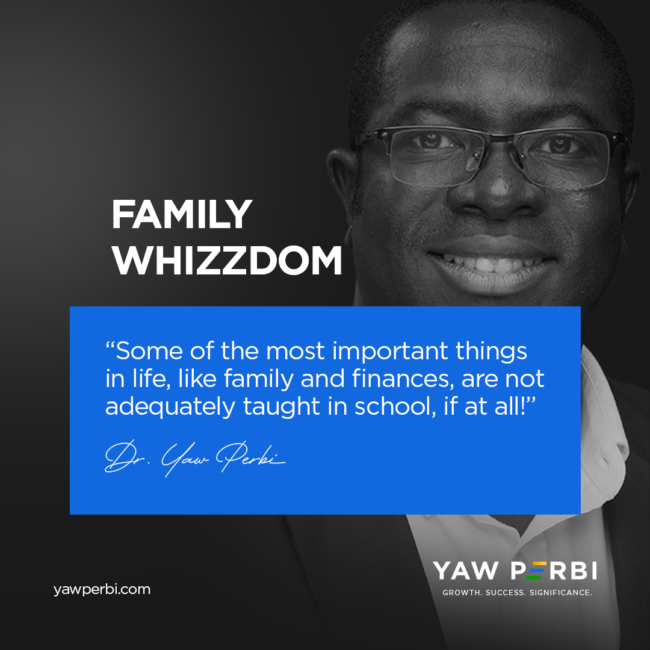
7 Reasons Why the Systematic Study of Family Matters
It gives me great joy that a number of high-flying professionals have chosen to pay up and show up at this year’s Family Foundations mastermind. The interesting group contains two professors (of marketing and microbiology), a couple of finance people (one of them works at the central bank of Ghana) and connecting online from three countries.
I admire their zeal and humility to jaw-jaw about family matters but something in me also makes me quite sad: Why are some of the most important things in life, like family and finances, not adequately taught in school, if at all?! Mind you, this current Family Foundations mastermind cohort has three people with doctorates, two PhDs and an MD!
The major thrust of this mastermind is to cause a paradigm shift on the prime place of family for us personally, for society in general and even for posterity (in other words WHY family matters) but even before delving into that everyone is being exposed to WHY a systematic study of family itself is necessary in the first place. Here are seven reasons why:
1. To understand SELF better.
“A systematic study of family will enable you to untangle your emotions from your understanding of family. An objective look at the varieties of families will better equip you to understand your own family relationships. This will allow you to bypass your preconceived ideas about marriage and family, come to a better understanding of yourself and your role within your family, and make more informed choices regarding future relationships.” (Riggs & Tweedell, pg. 2)
2. To understand OTHERS better.
“Taking a systematic view of marriage and family life will enable you to better comprehend the world in which you and your family operate.” (Riggs & Tweedell, pg. 3)
3. A way to uncover and derail MISCONCEPTIONS and MISPERCEPTIONS.
“People enter marriage and family relationships with a wealth of misconceptions and misperceptions… some common myths about mate selection, marriage, and parenting. With an objective understanding of marriage and family life, you should be better equipped to prevent or derail disillusionment in your future relationships.” (Riggs & Twedell, p.3)
4. To positively IMPACT your world.
We are “called to make a difference in the world. What better place to make a difference than within your own family? Most people are not called to a foreign country to perform mission work; they can find mission work right in their own communities. By understanding the varieties of ways of “doing” family, students can help those around them actualize the best marriage and family relationships possible.” (Riggs & Tweedell, p.3)
5. We need to get down to the core of all our beliefs, values and behaviour: WORLDVIEW.
6. Some of the most important things in life, marriage and family, are not adequately TAUGHT IN SCHOOL, if at all!
We’ve got to find these through an attitude of lifelong learning and a pursuit of informal and semi-formal growth opportunities like masterclasses and masterminds.
7. There are ancient THEOLOGIES, modern THEORIES, and practical TOOLS that make family work.
CONCLUSION
In the end, nothing works until you work it! And we have no right to say something doesn’t work unless and until we have worked it the prescribed way. I agree with Mark Twain that schooling and education are not the same. No matter how much schooling you’ve done, perhaps it’s time to get yourself an education on why family matters and how to make it work.
Reference
Riggs, Barbara A. And Cynthia Benn Tweedell. 2010. Marriage and Family: A Christian Perspective, 2nd Edition. Marion, Indiana: Triangle Publishing.
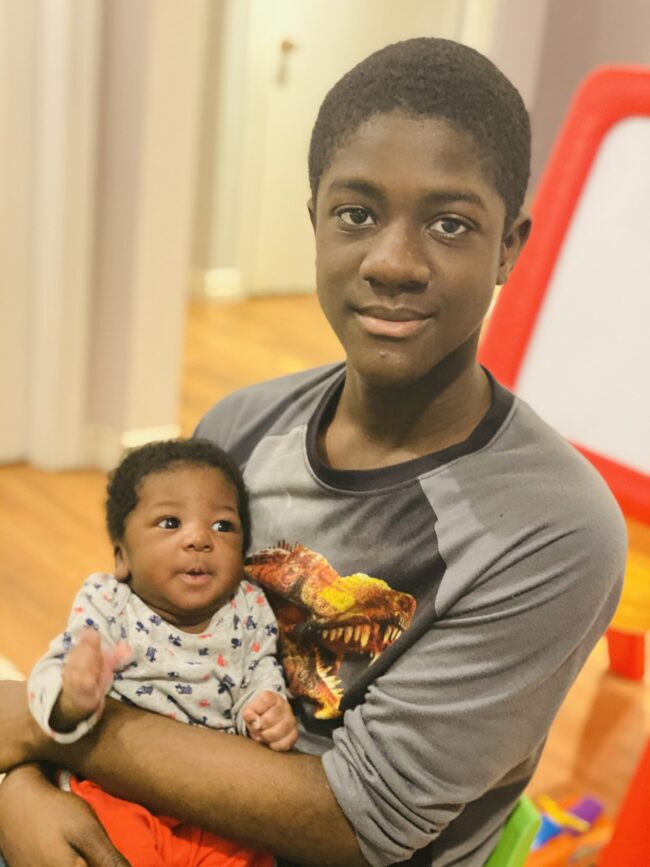
Family Foundations No One Lays Yet Everyone Needs
One of the most stupid things I’ve ever done is to travel 10 whole years into marriage before ever seeking formal post-marital counselling. After the several pre-marital sessions lasting many months in 2006, Anyele and I went in the power of that for a decade until we felt we needed further formal, external help. Why on earth did we do that?
Come to think of it, every 5,000 km or so we were changing the oil in our car and getting it serviced yet not so with our marriage. Doesn’t every marriage need regular marriage maintenance? Why wait till we’re sick before we see a doctor when we can at least do annual check-ups? In fact, I would say we came from a culture where seeing a counsellor connoted there was a pathology; and not so much a maintenance thing.
Friends, I’ve had several conversions since August 12, 2006 that have better aligned and further fortified what I thought were already ‘excellent foundations.’ Sometimes there’ve even been foundational cracks I’ve had to fix (and God knows I’m not done). For time to time I’ve come across new information that has caused me to repent, have a change of mind, and realign our foundations to keep this family building strong and lasting.
EXAMPLES OF FAMILY FOUNDATIONS TO REVISIT
Feel free to say “shame on you Yaw” but I had never heard of a family genogram until barely five years ago! How could such an important tool and exercise not have been part of our foundations when we set out a decade-and-a-half ago? And if you’re asking “what the heck is that?”, then trust me, you don’t even know you need one until you eventually discover it. Afterwards you would wonder how in the world your family had been surviving without one. I say ‘surviving’ because you will then notice that what you thought was ‘thriving’ wasn’t quite so.
Then there are basic tools for connecting with spouse and children on a deep emotional level we only received in the last five years. We learnt the 10/10 from the Pellmans and Temperature Reading from the Scazzeros. “Love your wife,” yes I want to. “Respect your husband,” yes she wants to. But how? The Kraemers also gave us tools for this.
And all this is for a good-looking couple who had a pretty solid family heritage, coming from a few generations of good Christian homes, being smart, leaders of our church youth fellowship who had lived virtuously and gotten married as virgins. We even themed our wedding “a celebration of purpose, passion and purity.” Alas! We who ‘had it all’ have realized there are family foundations everyone needs yet almost no one lays. The very marriage mentors who have been blessing us with these paradigms, praxes and practical tools are passionate about their ministry of marriage mentorship today precisely because they themselves didn’t have these when they were our age!
Family is a BIG deal. It is the basic unit of society, just like the cell is for all biological life and the atom is for all matter. Yet the thing about family foundations is this: just like finances, very little about how to make it work well is taught in school about it. If one isn’t fortunate to have a spiritual community that provides quality family life information and formation, you’re in a hard place. There are many divorces that are preventable, if the foundations could be reconfigured. There are some we’ve been able to help save by God’s grace; and others… well… too bad, too late.
THE MOST IMPORTANT PART
Few will argue against the assertion that the most important part of a building, or anything else that is built for that matter, say a marriage, is its foundation. A ton of things have been said about foundations. Gordon B. Hinckley asserts, “You can’t build a great building on a weak foundation. You must have a solid foundation if you’re going to have a strong superstructure.” Adding his voice, David Allan Coe says, “It is not the beauty of a building you should look at; its the construction of the foundation that will stand the test of time.” The greatest teacher of all time, Jesus Christ, classifies life builders into two categories, wise and foolish, purely based on thee foundations they lay: the foolish build on sand, the wise build on rock.
My beloved mentor Peter Scazzero talks about foundations a lot in the Emotionally Healthy Leadership paradigms he teaches. And no wonder, since like the typical New Yorker he is, Pete is ever so familiar with the skycraping towers of Manhattan. This is how he explains the importance of digging deep foundations if we are to build life’s tall towers of significance:
Manhattan consists almost entirely of bare granite, a very hard and strong type of rock. To carry the weight of a 75 or 100 story skyscraper, foundations known as “piles” are used. These are concrete or steel columns hammered into the ground with a massive crane until they penetrate solid rock.
Some pilings go twenty-five stories under the ground. The heavy weight of the skyscraper is then distributed through each of the deep “piles” in the ground below. Together they are capable of supporting the structure’s enormous weight.
If the pilings are drilled in poorly, cracks eventually appear in the structure. Entire buildings may lean. Then they must be torn down or lifted completely so the piles can be reset – a costly and time-consuming process.
FAMILY FOUNDATIONS MASTERMIND
As you might be aware from a previous blog, “a mastermind group (often shortened to just ‘masterminds’) is a peer-to-peer mentoring group used to help members learn together, solve problems, birth new ideas and gain clarity with input and advice from the other group members.” For eight weekly sessions, from April 4 to May 30, I shall be walking along with a dozen leaders who want to re-examine their family foundations and receive new paradigms, praxes and practical tools to finally fix faulty family foundations. Inputs will include several book chapters, videos, articles, practical exercises, discussions and debates. Two special features and benefits will be FREE membership of an online chest of over 20,000 resources and a FREE DISC Personality assessment with a 37-age customized report!
You can be sure that “mastermind groups are great in holding each other accountable for the goals and outcomes each member comes up with themselves” (see here). Outcomes and outputs of this particular Family Foundations Mastermind are as follows:
- Paradigm Shift on the Prime Place of Family
- Ancient Wisdom Applied
- Current Family Systems Theories Tested
- Practical Relationship Tools (for emotional connection, communication, forgiveness)
- Family Genogram
- Behavioural Assessment
- Emotional Needs List & Action Points
- Family Mission Statement
- Hierarchy of Priorities Configuration
- Integrated Life Exploration & Commitment
Register here and let’s go back to basics. Let’s finally fix faulty family foundations that everyone needs to but hardly anyone does.
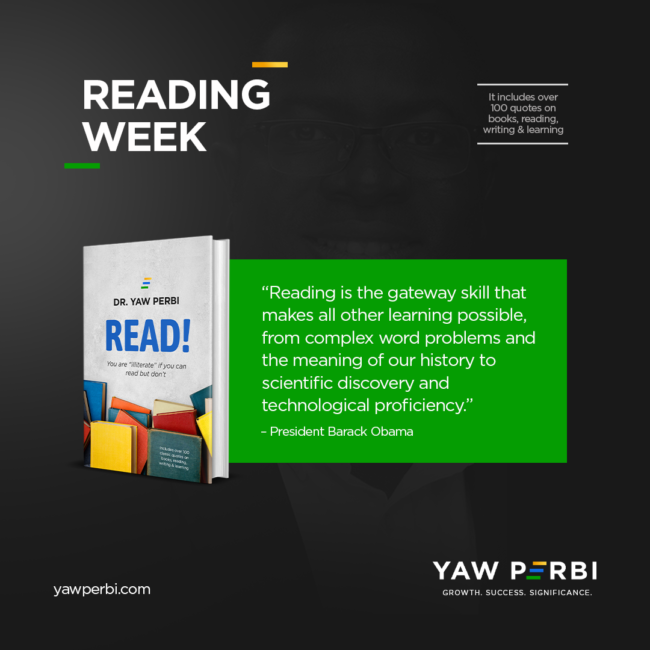
I Used Not To Like Reading. Two Statements Changed Everything.
I wouldn’t be where I am today but for books. I mean precious books like the Holy Bible (which I’ve read cover-to-cover about 10 times), Rich Dad Poor Dad (Robert Kiyosaki), The 7 Habits of Highly Effective People (Stephen Covey), The Purpose-Driven Life (Rick Warren), Before You Say I Do (Yaw Boamah), The 21 Irrefutable Laws of Leadership (John Maxwell), The E-Myth (Michael Gerber), The Prayer of Jabez (Bruce Wilkinson), Create Your Own Future (Brian Tracy), The Emotionally Healthy Leader (Peter Scazzero) etc. My life five years ago is totally different from my life now—and so was my life five years prior to that totally different—just because of the books I’ve read.
Consequently, for a decade-and-a-half now I’ve been a serious reading campaigner. Now, not only have I grown further fierce in campaigning for people to love reading, my wife and I have stepped up by stepping down. What I mean by that is, we’ve enhanced our campaign but decided to go further down to the age where humans are most pliable: childhood. And we began with our own seven children. This is the philosophy behind Perbi Cubs Library Services. You may find the story behind Perbi Cubs here.
But being a reading enthusiast, let alone champion, hasn’t always been so. I used not to like reading, at all! Then two statements hit me hard and totally shifted my paradigm, absolutely altering my way of thinking.
THE ‘RACIST’ & ‘TREMENDOUS’ STATEMENTS THAT CHANGED EVERYTHING
The first statement, I randomly encountered on the internet. I was but a youth then. As I confess in my book READ!, “I was so angry my intestines could have gushed out. If I were light skinned my face would’ve turned tomato-red instantaneously. Yet deep, very deep down my heart I knew there was a truth in this almost racist statement glaring at me from the computer screen.” This is what it said: “THE BEST WAY TO HIDE SOMETHING FROM BLACK PEOPLE IS TO PUT IT IN A BOOK!” Ah! Upsetting! Yet in many ways this is true, I’m ashamed to admit: We don’t read!
The other paradigm-knocking statement was Charlie ‘Tremendous’ Jones’ rather prophetic pronouncement: “You will be in five years where you are today except for the people you meet and the books you read.”
These two statements turned my life around to not only become a voracious reader and prolific writer, but an advocate of the same!
WHAT IS READING?
We all have read (or even still reading even right now) academic or technical texts to pass an exam or for promotion, for professional growth etc. That is not what I mean by my read campaign. When I speak of reading I mean leisure reading. Also known as “recreational reading, pleasure reading, free voluntary reading, and independent reading,” it is “independent, self-selected reading of a continuous text for a wide range of personal and social purposes. It can take place in and out of school, at any time” (International Reading Association).
Samuel Johnson shares the following sentiments: “A man ought to read just as inclination leads him; for what he reads as a task will do him little good.” I get him. Leisure reading must be voluntary and pleasurable–not just a chore–if it is to benefit us maximally.
WHY MANY ARE SCHOOLED BUT STILL “ILLITERATE”
Several of us who have learnt “ABCD…” and can practically function simply do not read. In my book READ!, first published in 2005, here’s my thesis: If you know how to read and you don’t, you are no different from the illiterate! The bottom line is the same: you both don’t read! That’s why the subtitle of the book is “You are an “illiterate” if you can read but don’t.” Many years ago Mark Twain put the same idea this way: “The man who does not read good books has no advantage over the man who cannot read them.”
CONCLUSION
If it’s any comfort to you, a guy who used not to like reading today reads several books at the same time! Even further, I’ve acquired this new habit of writing several books at the same time too! Something you need for your future to happen is hidden in a book near you. As they say at Perbi Cubs, “success is just a book away.” And it’s true. If you don’t believe Perbi Cubs or Charlie ‘T’ Jones, take it from me.

